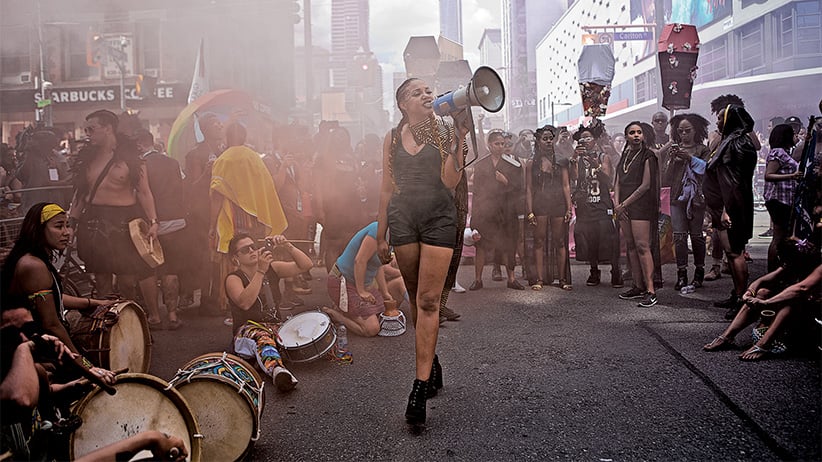400 years of African-Canadian history in a Dalhousie minor
In the wake of Black Lives Matter, Dalhousie University’s African-Canadian studies course emerges
Black Lives Matters protesters interrupt Toronto’s 2016 Pride Parade. (Photograph by Jennifer Roberts)
Share

The marginalized study of African-Canadian history and culture has taken centre stage at Dalhousie University this fall. A new interdisciplinary minor, black and African diaspora studies, will offer a contemporary and historic view of black history in Canada. It’s an area that program creator Afua Cooper says has long been ignored. “It’s still a submerged area of study,” she says. “Frankly speaking, I would say people in the university system haven’t seen black studies as something worthy of scholarly inquiry.”
Many courses only focus on certain branches of black history, and it often tends to be about the United States. Cooper, who is Dalhousie’s James R. Johnston chair in black Canadian studies, finds many Canadians don’t know about our black history beyond this past century. In fact, the presence of blacks in Canada dates back to 1604 and the Port Royal settlement. It’s this 400-year legacy, along with arts, culture and other topics, that Cooper wants to focus on. “Students will learn about the long-lasting black communities all over this country and the struggles and triumphs of black Canadians,” she says. “They faced a lot of discrimination throughout these centuries: social exclusion, segregation, segregated schools.”
Having this branch of study is even more important today, in the wake of Black Lives Matter. “Students may say, ‘Why do we have to learn about Viola Desmond, because it was 1946 and she was protesting racial segregation,’ ” says Cooper. “That’s gone, but here we are with Black Lives Matter . . . there’s a thread from Viola Desmond and events before her that connects to this.”
While she has been successful with her endeavour, Cooper isn’t the only one who saw an education gap and pushed for change at Dalhousie. In 1970, the late Halifax lawyer and activist Rocky Jones and James Walker, a professor in the University of Waterloo’s department of history, helped establish Dalhousie’s Transition Year Program (TYP), which helps Aboriginal and black students prepare for university. “Our intention was to break a syndrome of discrimination and disadvantages that were affecting black kids’ educational opportunities,” says Walker.
In doing so, they set the stage for something much bigger—even though it took more than 40 years to establish. Walker says he and Jones thought about a black studies program and brought it to the attention of Dalhousie’s then-president Henry Hicks and Nova Scotia premier Gerald Regan when setting up the TYP. However, it didn’t go past the idea stage. “We didn’t draw up a plan, and it wasn’t as advanced as what is happening now,” says Walker. “There wasn’t someone who studies that area, like there is with the black studies chair.”
Now that the new program is established—as a minor with three required courses and electives totalling 12 credit hours—Cooper is looking forward to seeing what it can bring to the Dalhousie community. “We will see what the interest is from students and the community and take it from there, with the intention of turning it into a major,” she says.
[widgets_on_pages id=”Education”]